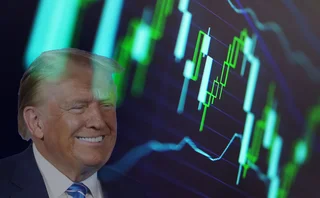
Are decentralised exchanges the future for trading?
Success of blockchain venues has implications even beyond crypto
Hayden Adams launched the decentralised crypto exchange Uniswap on November 2, 2018 by tweeting to his 200 followers and handing out home-printed T-shirts at an industry event. Three years later, spot trading on the new platform had reached the equivalent of $86 billion a day.
Decentralised exchanges such as Uniswap and the outlandishly named Sushiswap and Pancakeswap allow crypto buyers and sellers to trade at a price dictated by a protocol written on blockchain-based smart contracts.
They rely on automated market-maker algorithms to compute prices based on the relative weight of buyers and sellers in a single pool. It’s a different approach to the limit order book as used on centralised exchanges, where traders log bids and offers in a laddered hierarchy and wait to be matched.
Uniswap et al – part of the decentralised finance (aka ‘DeFi’) trend sweeping crypto – have grown fast to snap at the heels of centralised competitors such as Binance, Coinbase Exchange and FTX.
At one point, about a quarter of crypto spot trading was being done through the newer venues, data from The Block shows.
Could the upstarts, which function without central custodians, one day come to dominate? Recent research says they can – and probably will. Some even think the decentralised model will become the norm in traditional asset classes too.
The all-in transaction costs of decentralised versus centralised exchanges in crypto are roughly even, academics from the University of St Gallen and Swiss Finance Institute found. And Uniswap’s bid/ask spreads are similar or better, and more stable, than leading centralised competitors.
Centralised – ‘CeFi’ – venues are less vulnerable to price dislocations, it seems. Arbitrage trades are expensive on decentralised exchanges because gas fees apply at each of the multiple trading steps often needed. These fees don’t apply on a centralised hub, which operates off-chain.
Reductions in gas fees, though, together with a modest increase in trading volumes would tip the balance in favour of decentralised exchanges, the researchers estimate. And gas fees are expected to come down after the ethereum blockchain’s recent move to a proof-of-stake model.
“It’s going to be harder and harder for centralised exchanges to be profitable,” says Andrea Barbon, assistant professor of finance at the University of St Gallen. In crypto, decentralised exchanges may “take over a huge fraction of market share”, he thinks.
Of course, market participants have reasons other than cost savings to trade on more conventional venues: technical hitches can take time to fix on a decentralised protocol, for example (the process occurs through participants voting for updates).
Regulators may seek to ensure that trading stays on centralised exchanges where they can exercise control or carry out surveillance more easily.
But crypto traders are quick to adopt new practices, as shown already by the rapid advance of decentralised venues so far. “We are always looking at liquidity and [on that metric] the decentralised exchanges are coming up,” said Hugo Langéen, CEO and co-founder at Valid Alpha, a crypto hedge fund, speaking at Risk.net’s Cryptocurrency Trading Forum in September. If that continues, he said, his fund would switch more of its trading.
Crypto’s credit crisis in recent months, in which several large players in the space collapsed causing knock-on losses for others, might even spur the process. Truly decentralised parts of the infrastructure “worked perfectly” during the upheaval, argues Magnus Holm, CIO at Hilbert Capital, a systematic crypto fund.
Carol Alexander, a professor at the University of Sussex, told delegates at the conference that DeFi could potentially dominate nine-to-one in crypto in as little as two or three years.
And it might not stop there. Niclas Sandstrom, Hilbert’s CEO, says volatility in gas fees, trades getting rejected and latency remain DeFi’s weaknesses, for now. But those will all change. “We’re not there yet,” he says. “But decentralised exchanges will take over in future.”
Only users who have a paid subscription or are part of a corporate subscription are able to print or copy content.
To access these options, along with all other subscription benefits, please contact info@risk.net or view our subscription options here: http://subscriptions.risk.net/subscribe
You are currently unable to print this content. Please contact info@risk.net to find out more.
You are currently unable to copy this content. Please contact info@risk.net to find out more.
Copyright Infopro Digital Limited. All rights reserved.
As outlined in our terms and conditions, https://www.infopro-digital.com/terms-and-conditions/subscriptions/ (point 2.4), printing is limited to a single copy.
If you would like to purchase additional rights please email info@risk.net
Copyright Infopro Digital Limited. All rights reserved.
You may share this content using our article tools. As outlined in our terms and conditions, https://www.infopro-digital.com/terms-and-conditions/subscriptions/ (clause 2.4), an Authorised User may only make one copy of the materials for their own personal use. You must also comply with the restrictions in clause 2.5.
If you would like to purchase additional rights please email info@risk.net
More on Our take
Fannie, Freddie mortgage buying unlikely to drive rates
Adding $200 billion of MBSs in a $9 trillion market won’t revive old hedging footprint
Degree of Influence 2025: Derivatives pricing dominates; quants don’t follow the AI herd
Rates and volatility modelling, as well as trade execution, top quants’ priorities
There’s a punt factor in stocks that investors might be missing
Speculative trading creates linkages between crypto and equities that vary depending on the stocks in question
Passive investing and Big Tech: an ill-fated match
Tracker funds are choking out active managers, leading to hyped valuations for a dangerously small number of equities
Sticky fears about sticky inflation
Risk.net survey finds investors are not yet ready to declare victory on inflation – with good reason
Why a Trumpian world could be good for trend
Trump’s U-turns have hit returns, but the forces that put him in office could revive the investment strategy
Roll over, SRTs: Regulators fret over capital relief trades
Banks will have to balance the appeal of capital relief against the risk of a market shutdown
Thrown under the Omnibus: will GAR survive EU’s green rollback?
Green finance metric in limbo after suspension sees 90% of top EU banks forgo reporting








